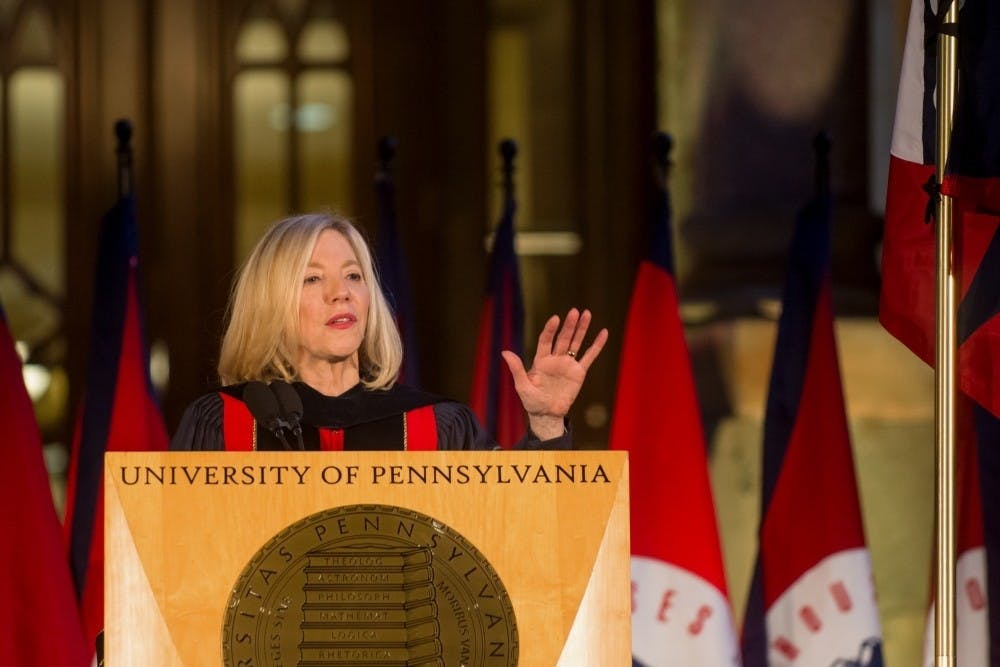
Penn administrators have offered few details as to how the recommendations released by the University task force specifically combat sexual violence and harassment. This is in spite of a foundational goal of the task force being “to foster a campus climate and culture that is free of sexual harassment and sexual violence.”
In an interview with The Daily Pennsylvanian, Penn President Amy Gutmann said the task force’s “overarching” goal had been to keep students safe from all types of harm, from sexual assault to “falling behind in their studies.”
“The goal,” she said, “is to keep our students safe — not only safe in one way; safe in all ways.”
The phrase “sexual violence” does not appear once in the list of recommendations released in April by the task force. President Gutmann and former Provost Vincent Price formed the task force in November 2016 with the broad goals of combatting sexual violence, holding off-campus organizations — which function largely as underground fraternities and sororities — accountable for disciplinary violations and clarifying the Code of Student Conduct.
Since the task force's formation in November 2016 and throughout its months-long process of gathering feedback from student groups, administrators have repeatedly noted that the group’s purview was broader than just preventing sexual violence. Nothing in its official name, the “Task Force on a Safe and Responsible Campus Community,” suggested a specific focus on sexual violence prevention.
In an email sent to the student body on Aug. 17, administrators said the task force "explored student social culture and concerns related to alcohol and other substance abuse, sexual harassment and hazing."
Despite its apparently broad focus, students and other observers have typically conflated the task force with a University-sponsored effort at sexual violence prevention due to the circumstances surrounding its formation.
In September 2016, protesters plastered the LOVE statue and other spots around campus with a sexist party invitation sent specifically to freshmen women by the off-campus organization OZ. Protesters cited the invitation as an example of how rape culture can be perpetuated at Penn. A media storm surrounding the incident quickly arose, with figures ranging from Pennsylvania Gov. Tom Wolf to actor Ashton Kutcher publicizing the protest.
When the task force was initially announced in a University-wide email that November, Gutmann and Price specifically mentioned the OZ email as an inciting incident.
“Penn has made widespread, concerted efforts to prevent sexual assault and sexual violence on our campus and to create a healthier and safer environment for all members of our community. There is always more work to be done,” the email read. “Groups such as OZ operate outside the University and engage in high-risk behaviors that may be injurious to their members or others, and undermine our collective efforts to create a respectful and healthy environment for all of our students.”
The recommendations from that task force has spawned a crackdown on unregistered events and formal attempts to regulate off-campus groups. However, in an interview with The Daily Pennsylvanian, Gutmann and Penn Provost Wendell Pritchett could not name a single new policy or enforcement strategy stemming from the task force that is directly targeted at combating sexual assault.
“There are many things we have done preceding and following the task force, whose goal [was] to keep students safe from sexual assault, safe from accidents and safe to pursue their studies in a productive way,” Gutmann said.
Many of the task force’s recommendations, which have included tightening the rules around registered social events and extending them to all student groups, have confused critics who fail to understand how these restrictions lead to student safety. Without a detailed explanation from administrators as to which policies target which problems, students seem to be left in the dark as to how systemic campus problems like sexual violence are actually being targeted.
Pritchett, who officially became provost months after the task force released its final report, said he has met repeatedly with undergraduate and graduate student leadership to discuss the controversy over the task force’s recommendations.
“Again, there are always changes you can have to a specific implementation of the policy,” he said, “but I feel very good about the work of the task force and how things have been going since the recommendations have been implemented.”
The Daily Pennsylvanian is an independent, student-run newspaper. Please consider making a donation to support the coverage that shapes the University. Your generosity ensures a future of strong journalism at Penn.
Donate







